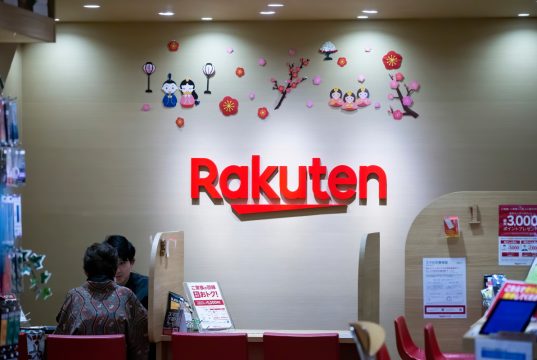Back in the 90’s when Jeff Bezos was setting up Amazon as an online bookstore in the US, Hiroshi Mikitani was already gearing up to launch Japan’s first e-commerce platform. Today, Rakuten is the biggest e-commerce firm in the island nation, and it has plans to become even bigger. In an exclusive interview with Nikkei, Chairman and CEO Hiroshi Mikitani said Rakuten e-commerce aims to double its domestic turnover to 10 tn yen ($78.9 bn), with the help of its nascent mobile business.
Rakuten was founded in 1997, and it currently offers over 70 different services to its 1.6 billion members around the world. While Rakuten e-commerce is the core business, the group has diversified into other sectors and created a membership-based ecosystem with a rewards system called Rakuten Points. Rakuten’s most recent leap of faith has been the virtualized cloud-native mobile network for 4G and 5G connectivity. However, the issue is about how the company aims to converge its e-commerce and telecommunications business to drive overall growth, even as it continues to report losses.
Scaling Rakuten e-commerce
For the fiscal year 2021 (FY, from January to December 2021), Rakuten Group recorded revenue growth in all its three segments — internet services, fintech and mobile. However, the loss widened to 133.83 bn yen ($1.03 bn) in FY2021, compared to a loss of 114.20 bn yen ($871.51 m) the previous year. The company said the loss was attributable to the hefty investment being made in building mobile base towers across the country.
Meanwhile, the e-commerce business saw domestic gross merchandise sales (GMS) for FY2021 cross 5 tn yen. The company achieved this milestone within a year of hitting 4 tn yen of GMS. Rakuten in its FY2021 results announcement said the GMS value increased due to cross-use between Rakuten Ichiba and its other e-commerce services. The company adds that nearly 75% of its users had used more than one service in FY2021.
Probably the most important metric here is that 35% of Rakuten Mobile subscribers who had never used any other Rakuten service before were now using Rakuten Ichiba — the flagship e-commerce service.
Rakuten Mobile is trying to poach customers of market leaders such as NTT Docomo (over 40% market share), Softbank Group and KDDI, by offering cheap plans. However, the telecom business is making losses (FY2021- loss of 421 bn yen). The company has not provided clear details on subscriber additions or monthly active users.
“Uniting retail with telecoms has not always proved easy,” Kester Mann, an analyst with UK research group CCS Insight told Financial Times in 2020. “It is an approach that needs careful brand positioning, strong marketing investment and coherent execution. Few have been able to find the right balance, so far.”
Rakuten’s Chief Marketing Officer and Group Managing Executive, Naho Kono, had told FT back in 2020 that its existing ‘points’ programme was at the centre of the cross-service use strategy.
Relation between Rakuten e-commerce and telecom
“The synergies between mobile and e-commerce are greater than anticipated, and gross merchandise sales will grow at an accelerated pace,” Mikitani tells Nikkei. While the CEO seems confident, we need to explore the rationale behind this statement.
Rakuten Mobile first launched as a Mobile Virtual Network Operator (MVNO) service in 2014, and officially entered the cellular industry in December 2017. It was allocated 4G and 5G spectrum in subsequent years. The major difference between Rakuten Mobile and other traditional telecom firms is the former’s virtualized cloud-native network – a system that delinks the hardware and software of the network provider. In simpler terms, Rakuten’s technology needs only network device upgrades on its towers instead of updating all the hardware arrays for a variety of services.
The virtualized network allows the company to create multiple network streams using cloud services to cater to specific users or use cases.
As of early 2022, Rakuten Mobile covers 96% of Japan’s population, largely thanks to its ‘Super Hodai’ plans — which include data and unlimited 10-minute calls.
The company on its website says Rakuten Mobile “has the opportunity to realize countless ideas through combining the big data it has accumulated with the massive Rakuten Ecosystem”. This implies the group intends to use its vast ecosystem of members and rewards system for directing consumers to its other services.
However, this begs the question of how Rakuten plans to achieve this synergy?
Rakuten ecosystem strategy
A quick glance at the Rakuten e-commerce website sheds light on how the company is using its points system. A customer buying a Rakuten Mobile plan gets a certain number of loyalty points that they can use to avail of any other Rakuten service. Customers using Rakuten’s payments app to make purchases get discounts, while a mobile phone user porting to Rakuten’s network gets additional benefits.
The company has also launched its own mobile phones, a venture like Amazon’s Fire devices, that aims to create a stronger relationship between mobile phone users and the e-commerce platform.
With regards to using Big Data, Kono had said that the company will combine location data and customers’ retail habits to increase customer loyalty and platform activity.
Meanwhile, Mikitani told Nikkei he expects Rakuten’s export of 5G technology to increase as several countries are looking for alternatives to Chinese telecommunications equipment owing to privacy concerns.
The first such contract came in 2021 from Germany, where Rakuten Mobile is working with 1&1 AG to build, run and maintain a fully virtualized network in the EU nation, in a deal valued over $2 bn.
Earlier this year, a new subsidiary called Rakuten Symphony was established, which has already inked deals with AT&T, Cisco, Nokia and Qualcomm to push its network solutions.
(1 USD = 129.79 yen)










 Australia
Australia China
China India
India Indonesia
Indonesia Japan
Japan Malaysia
Malaysia Philippines
Philippines Singapore
Singapore South Korea
South Korea Taiwan
Taiwan Thailand
Thailand Vietnam
Vietnam Germany
Germany Hong Kong
Hong Kong USA
USA Switzerland
Switzerland Singapore
Singapore
 United Kingdom
United Kingdom








